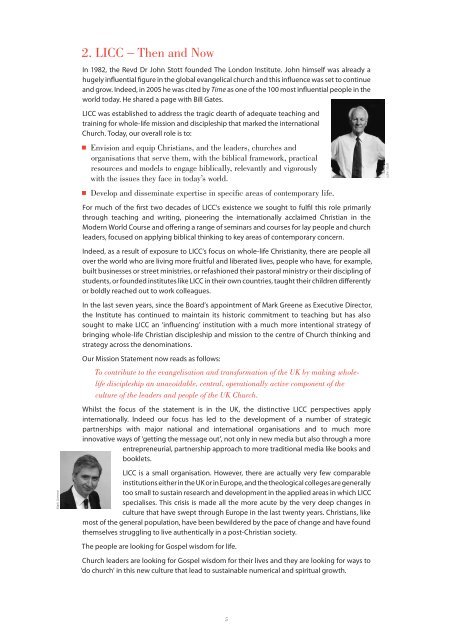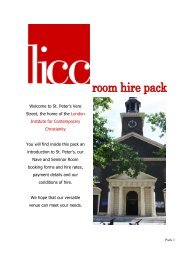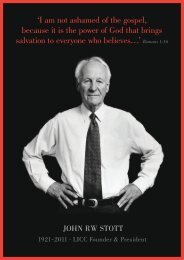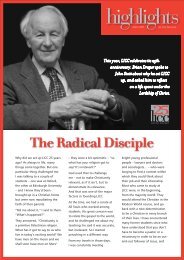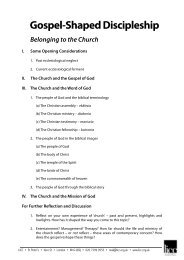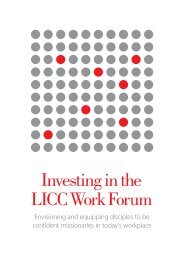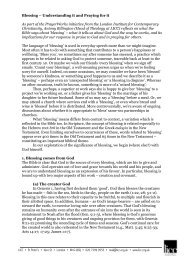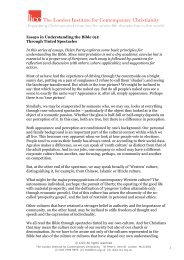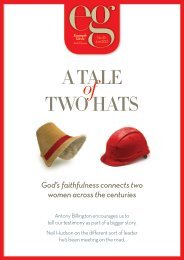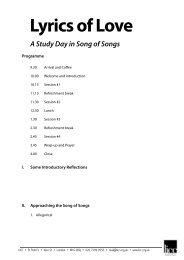Vision & Activities booklet - The London Institute for Contemporary ...
Vision & Activities booklet - The London Institute for Contemporary ...
Vision & Activities booklet - The London Institute for Contemporary ...
Create successful ePaper yourself
Turn your PDF publications into a flip-book with our unique Google optimized e-Paper software.
Mark Greene<br />
2. LICC – <strong>The</strong>n and Now<br />
In 1982, the Revd Dr John Stott founded <strong>The</strong> <strong>London</strong> <strong>Institute</strong>. John himself was already a<br />
hugely influential figure in the global evangelical church and this influence was set to continue<br />
and grow. Indeed, in 2005 he was cited by Time as one of the 100 most influential people in the<br />
world today. He shared a page with Bill Gates.<br />
LICC was established to address the tragic dearth of adequate teaching and<br />
training <strong>for</strong> whole-life mission and discipleship that marked the international<br />
Church. Today, our overall role is to:<br />
Envision and equip Christians, and the leaders, churches and<br />
organisations that serve them, with the biblical framework, practical<br />
resources and models to engage biblically, relevantly and vigorously<br />
with the issues they face in today’s world.<br />
Develop and disseminate expertise in specific areas of contemporary life.<br />
For much of the first two decades of LICC’s existence we sought to fulfil this role primarily<br />
through teaching and writing, pioneering the internationally acclaimed Christian in the<br />
Modern World Course and offering a range of seminars and courses <strong>for</strong> lay people and church<br />
leaders, focused on applying biblical thinking to key areas of contemporary concern.<br />
Indeed, as a result of exposure to LICC’s focus on whole-life Christianity, there are people all<br />
over the world who are living more fruitful and liberated lives, people who have, <strong>for</strong> example,<br />
built businesses or street ministries, or re fashioned their pastoral ministry or their discipling of<br />
students, or founded institutes like LICC in their own countries, taught their children differently<br />
or boldly reached out to work colleagues.<br />
In the last seven years, since the Board’s appointment of Mark Greene as Executive Director,<br />
the <strong>Institute</strong> has continued to maintain its historic commitment to teaching but has also<br />
sought to make LICC an ‘influencing’ institution with a much more intentional strategy of<br />
bringing whole-life Christian discipleship and mission to the centre of Church thinking and<br />
strategy across the denominations.<br />
Our Mission Statement now reads as follows:<br />
To contribute to the evangelisation and trans<strong>for</strong>mation of the UK by making wholelife<br />
discipleship an unavoidable, central, operationally active component of the<br />
culture of the leaders and people of the UK Church.<br />
Whilst the focus of the statement is in the UK, the distinctive LICC perspectives apply<br />
internationally. Indeed our focus has led to the development of a number of strategic<br />
partnerships with major national and international organisations and to much more<br />
innovative ways of ‘getting the message out’, not only in new media but also through a more<br />
entrepreneurial, partnership approach to more traditional media like books and<br />
<strong>booklet</strong>s.<br />
LICC is a small organisation. However, there are actually very few comparable<br />
institutions either in the UK or in Europe, and the theological colleges are generally<br />
too small to sustain research and development in the applied areas in which LICC<br />
specialises. This crisis is made all the more acute by the very deep changes in<br />
culture that have swept through Europe in the last twenty years. Christians, like<br />
most of the general population, have been bewildered by the pace of change and have found<br />
themselves struggling to live authentically in a post -Christian society.<br />
<strong>The</strong> people are looking <strong>for</strong> Gospel wisdom <strong>for</strong> life.<br />
Church leaders are looking <strong>for</strong> Gospel wisdom <strong>for</strong> their lives and they are looking <strong>for</strong> ways to<br />
‘do church’ in this new culture that lead to sustainable numerical and spiritual growth.<br />
John Stott<br />
5


